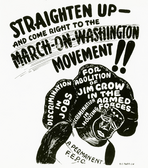Description
- Overview:
- Civil rights for Black Americans was not on the national agenda in the 1930s. Segregation and subordination of Black Americans were firmly rooted throughout American society and in all parts of the country. The Great Depression and later the emerging war crisis in Europe dominated national attention. Southerners in Congress opposed changes to help Black Americans, including anti-lynching bills, and amended New Deal legislation to deny Black Americans the benefits and programs being offered to white citizens. This module examines the leadership of three very different Americans—First Lady Eleanor Roosevelt, world-renowned contralto Marian Anderson, and labor leader A. Philip Randolph. They each shared strong inner voices, an ability to imagine a world beyond the bounds allowed by the politics and society of their day, and a willingness to take risks for controversial civil rights advances in which they believed—all at a time when segregation and Black American deprivation were central aspects of American society in every part of the country.
- Subject:
- History, Law, Politics, U.S. History, Ethnic Studies
- Level:
- High School, Community College / Lower Division, College / Upper Division
- Material Type:
- Full Course, Lesson Plan, Module
- Author:
- Robert Eager
- Provider:
- The Reconciliation Education Project
- Provider Set:
- Own Your History
- Date Added:
- 06/27/2024
- License:
-
Creative Commons Attribution Non-Commercial Share Alike

- Language:
- English
- Media Format:
- Text/HTML
Standards
Evaluations
No evaluations yet.


Comments